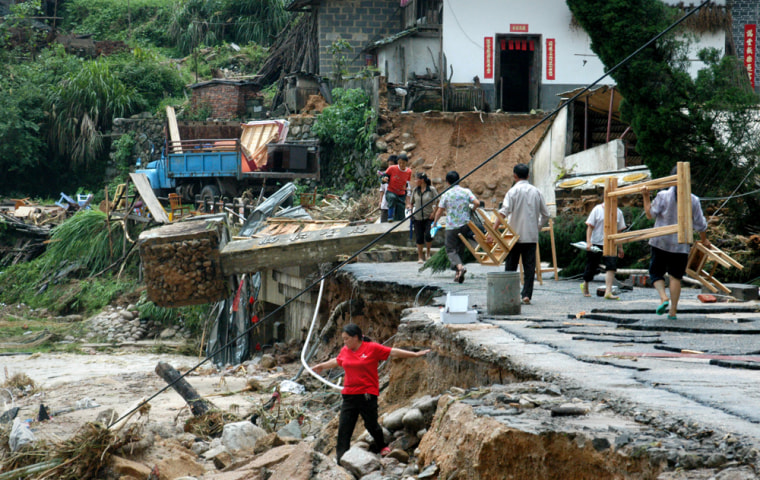With Typhoon Kaemi roaring toward Jinjiang in China's crowded southeast, Dr. Yang was sealing his apartment windows against the pounding rain when his cell phone buzzed to life.
"Typhoon forecast to make land this evening near Jinjiang," said the message, which was sent to millions of mobile phones in the coastal city and surrounding Fujian province. "Please attend to preparations."
More often used by gossipy teenagers, mobile phone messages have become a key tool for Chinese authorities who need to alert millions of villagers and fishermen during this year's unusually powerful typhoon season.
Mobile phones are so common in China that almost one in three of its 1.3 billion people has one, making them a rival power to television and radio in reaching the public.
In Fujian, authorities have sent 18 million messages — known as SMS, for short message service — with storm information during five typhoons this year, according to the provincial government.
"Technology is improving, and I think the government sending messages to warn of natural disasters is pretty smart," said Dr. Yang, who works at Jinjiang's Chinese medicine hospital and would give only his surname.
The system is still in its infancy, and residents contacted Thursday said they already knew Kaemi was coming before getting the messages and didn't do anything differently because of them.
Still, the messages did "remind people to be careful, and I think that's very good," said Lin Feilong, a member of the staff at the Jinjiang Youth and Children's Activity Center.
"At least much better than the usual junk messages," he said, referring to the many advertisements, greetings and other messages that customers are bombarded with every day.
China has by far the world's biggest population of mobile phone users — 426 million as of last month and growing rapidly. And that figure long ago surpassed the country's 365 million fixed-line phones.
Mobile phone use has spread from affluent urban consumers to blue collar workers and farmers in the poor countryside. It isn't unusual to find villages with no fixed lines but dozens of mobile customers.
The government has encouraged the spread of mobile phones because the infrastructure is cheaper than fixed line phones, which require expensive networks of wires to link homes and businesses.
Chinese mobile carriers have built a nationwide network with such extensive coverage that phones work in places as far-flung as the Tibetan plateau and the northwestern deserts.
Text messaging is exploding, with 25 billion messages sent each month.
The government has used SMS to reassure the public about bird flu outbreaks and warn against supporting for the banned Falun Gong spiritual movement or taking part in unauthorized protests.
"Obey the law. Maintain order," said a message sent to millions of phones in Shanghai and Beijing last year in an effort to rein in violent anti-Japanese protests.
In part, the government was been playing catch-up to political activists when it used SMS to try to quell protests.
The demonstrations had been organized and coordinated by activists using phone messages and e-mail. Authorities at one point resorted to cutting off cell phone service near the Japanese Consulate in Shanghai in an effort to stop an unusually violent protest.
The government also was also shaken by the use of text messaging to spread outbreak rumors in 2003 during the severe acute respiratory syndrome epidemic.
The Shanghai government responded with its own messages telling the public to ignore the rumors.
Fujian, with 14 million mobile phone subscribers, decided SMS was the most effective way to keep people informed, said Wu Jiangbo, an official from General Office of Fujian Communication Administration.
The province has 39.9 mobile phones per hundred people, versus 30.2 fixed residential lines per hundred.
As Kaeimi approached, Wu's office organized China's top three mobile carriers, China Mobile, China Netcom and China Telecom, to send the warning message.
Wu said the government sent weather updates and other information, though many people reached in Fujian on Thursday said they received at most one message.
In all, 8.48 million messages were sent out before the storm passed, Wu said.
Residents said they hope for more information next time.
"The content was not really useful," said 23-year-old Zhou Lin, an editor in the provincial capital of Fuzhou, who said he received a sole warning message.
"Still," he said, "it's better than nothing."
